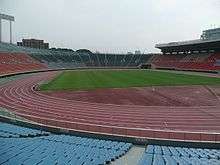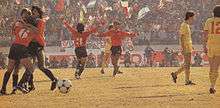1984 Intercontinental Cup
|
Match programme cover | |||||||
| |||||||
| Date | 9 December 1984 | ||||||
|---|---|---|---|---|---|---|---|
| Venue | National Stadium, Tokyo | ||||||
| Man of the Match | José Percudani (Independiente)[1] | ||||||
| Referee | Romualdo Arppi Filho (Brazil) | ||||||
| Attendance | 62,000 | ||||||
The 1984 Intercontinental Cup was an association football match between Liverpool F.C. of England and Club Atlético Independiente of Argentina on 9 December 1984 at the National Stadium in Tokyo, Japan, the annual Intercontinental Cup contested between the winners of the Copa Libertadores and European Cup. Independiente were appearing in their sixth Intercontinental Cup, they had won the competition once in 1973 and lost the other four. Liverpool were making their second appearance in the competition, after their loss in 1981.
The teams had qualified for the competition by winning their continent's primary cup competition. Independiente qualified by winning the primary South American cup competition, the Copa Libertadores. They won the 1984 Copa Libertadores defeating Brazilian team Grêmio 3–1 on points in the finals. Liverpool qualified by winning the primary European cup competition, the European Cup. They beat Italian team A.S. Roma 4–2 in a penalty shoot-out after the match finished 1–1.
Watched by a crowd of 62,000, Independiente took the lead in the sixth minute when José Percudani scored. Liverpool had the better of the possession during the match, but they were unable to convert their chances ad the match finished in a 1–0 victory to Independiente. The win was the Argentine club's second triumph in the competition and the fifth in a row by the South American team.
Match
Background

Independiente qualified for the Intercontinental Cup as the reigning Copa Libertadores winners. They had won the 1984 Copa Libertadores beating Grêmio 3–1 on points over two legs in the finals. It would be Independiente's sixth appearance in the competition. Their previous five appearances had resulted in one win in 1973 and four defeats in 1964, 1965, 1972 and 1974.[2]
Liverpool had qualified for the Intercontinental Cup as a result of winning the 1983–84 European Cup. They had beaten Roma 4–2 in a penalty shoot-out after the match finished 1–1 to win their fourth European Cup. Liverpool were appearing in their second Intercontinental Cup. Their appearance in 1981 resulted in a 3–0 defeat against Flamengo. Liverpool were scheduled to appear in 1977 and 1978 but did not compete. They declined to play in 1977 and were replaced by runners-up Borussia Mönchengladbach, while in 1978, Liverpool and Boca Juniors declined to play each other.[2]
Liverpool's last match before the Intercontinental cup was against Coventry City in the 1984–85 Football League. They won 3–1 courtesy of two goals from John Wark and one from Ian Rush.[3] The last match Independiente played before the Intercontinental Cup was against Rosario Central in the 1984 Argentine Primera División, which they lost 1–0.[4]
Summary

Before the match, Liverpool lost defender Mark Lawrenson who had injured his hamstring in training. Gary Gillespie was his replacement.[5] Liverpool kicked off the match and the first few exchanges saw a number of rash tackles. Independiente defender Carlos Enrique tackled Craig Johnston robustly, but the referee indicated to play on. Moments later Liverpool midfielder Jan Mølby tackled Enrique late, which prompted the referee to award a free kick. Liverpool controlled the opening exchanges of the match, but could not work the ball into the Independiente penalty area.[6] However, it was Independiente who opened the scoring, Claudio Marangoni sent a ball over the Liverpool defence for striker José Percudani, whose low shot beat the advancing Liverpool goalkeeper Bruce Grobbelaar to give Independiente a 1–0 lead.[7]
Following the goal, Independiente under instruction rom their manager José Pastoriza, began to sit back in their own half inviting Liverpool to attack them. Their plan worked as Liverpool were unable to break down their defence, while their strikers Percudani and Alejandro Barberón counter-attacked when Independiente received the ball.[6] The second half saw Liverpool continue to attack the Independiente goal, but to no avail. Midfielders John Wark and Mølby tried to find a way through the Independiente defence was equal to their efforts. Wark's efforts trying to engineer an equalising goal resulted in him being substituted for Ronnie Whelan in the 76th minute, due to fatigue.[6]
Despite being the better team for the majority of the match, Liverpool were unable to beat the Independiente defence, with their shooting in front of goal being the culprit. Both sides questioned some of the referee's decisions. Liverpool believed they should have had two penalties, while Independiente felt that the assistant referee's decisions were questionable. Incidentally, the referee had served half of his two match ban handed out by the Brazilian Football Association.[5]
Details
Liverpool
|
Independiente
|
|
| ||||||||||||||||||||||||||||||||||||||||||||||||||||||||||||||||||||||||||||||||||||||||||||||||||||||||||||||||||||||||||||||||
|
Man of the Match:
|
Post-match
Despite the defeat, Liverpool manager Joe Fagan could not fault the effort his players had put in: "Independiente are a good defensive tactical team and we could find no way through, the weather was ideal, we were just as fit as they were. The South Americans have better ball control than we do. We were disappointed with the result but I wasn't disappointed with the display."[5]
Liverpool finished the 1984–85 Football League in second place 13 points behind local rivals Everton.[9] They also reached the final of the 1984–85 European Cup, which they lost 1–0 to Juventus. However the events of the match were overshadowed for the disaster that occurred before kick-off. Liverpool fans breached a fence separating the two groups of supporters and charged the Juventus fans. The resulting weight of people caused a retaining wall to collapse, killing 39 people and injuring hundreds. English clubs were banned indefinitely from European competition, with a condition that when the ban was lifted, Liverpool would serve an extra three-year ban.[10] The ban eventually lasted for five years, clubs returning to European competition in the 1990–91 season.[11]
Independiente would finish their season in the Primera Division in 14th place.[4] Despite this, they competed in the 1985 Copa Libertadores as the reigning champions. However, they were unable to retain their title as they exited in the semi-finals.[12]
See also
Footnotes
- 1 2 Lene de Arruda, Marceloi (2 January 2009). "Toyota Cup – Most Valuable Player of the Match Award". Rec. Sport. Soccer. Statistics. Foundation. Retrieved 23 December 2009.
- 1 2 Stokkermans, Karel; Magnani, Loris (30 April 2005). "Intercontinental Club Cup". Rec.Sport.Soccer Statistics Foundation (RSSSF). Retrieved 15 December 2011.
- ↑ "Liverpool 3–1 Coventry City". LFC History. Retrieved 3 June 2015.
- 1 2 Ciullini, Pablo (20 March 2009). "Argentina 1984". Rec. Sport. Soccer. Statistics. Foundation. Archived from the original on 19 July 2015. Retrieved 3 June 2015.
- 1 2 3 Harrison, Gerry (10 December 1984). "Liverpool fail to bridge the gulf on the field". The Times. London.
- 1 2 3 Ginnell, Luke (4 November 2014). "The elusive trophy: thirty years on, how Liverpool's greatest team failed to rule the world". FourFourTwo. Retrieved 3 June 2015.
- ↑ "1984: Independiente deny Liverpool". Union of European Football Associations (UEFA). 9 December 1984. Retrieved 15 December 2011.
- ↑ "Toyota Cup 1984". FIFA. Archived from the original on March 6, 2008. Retrieved 4 June 2015.
- ↑ Felton, Paul. "Season 1984–85". Rec. Sport. Soccer. Statistics. Foundation. Retrieved 3 June 2015.
- ↑ Ponting (1992, p. 189)
- ↑ Hutchings,Nawrat (1995, p. 251)
- ↑ Ciullini, Pablo; Stokkermans, Karel (29 November 2012). "Copa Libertadores de América". Rec. Sport. Soccer. Statistics. Foundation. Retrieved 3 June 2015.
References
- Hale, Steve; Ponting, Ivan (1992). Liverpool In Europe. London: Guinness Publishing. ISBN 0-85112-569-7.
- Hutchings, Steve; Nawrat, Chris (1995). The Sunday Times Illustrated History of Football: The Post-War Years. London: Chancellor Press. ISBN 1-85153-014-2.
External links
- FIFA Article Archived
- Match Report at LFC History
